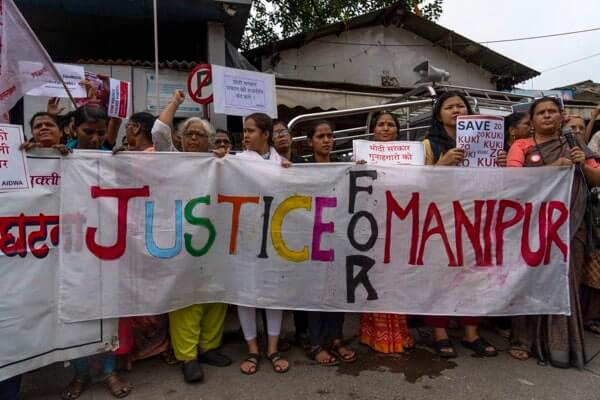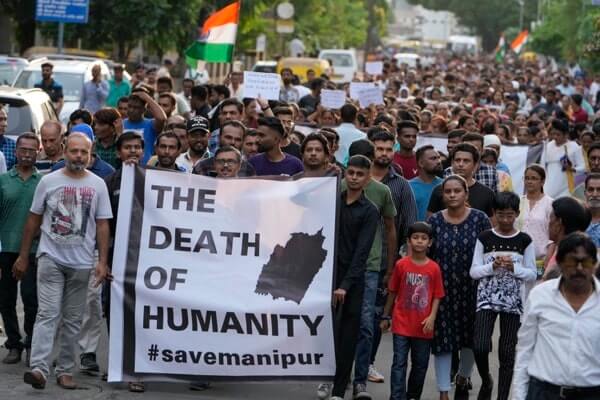Ever since the viral video of two women stripped naked and paraded in Manipur came to light, turmoil in this northeastern state of India shows no signs of abating.
Topping off months of smouldering unrest that went inadequately attended, the dehumanising event brought an equal sense of shame and rage nationwide, and beyond. The recent arrests of some perpetrators did but little to assuage the pain.
The ongoing ethnic violence between the Meitei and Kuki communities has led to a massive disruption in the way of life, with attacks by armed militants and curfews continuing, even as lack of housing and job insecurities strike the people on both sides of the divide.
Mamantam Sharma Aribam, a Manipuri Australian based in Sydney and working in IT, is deeply troubled at the situation in his home state.
“In this scenario, civilians and regular people are the sufferers,” he told Indian Link.
In a video comment that he put out recently on the issue, he commented on his failing regard for Prime Minister Narendra Modi for not handling the situation like “a national leader”.
“I’ve been a huge fan of Modiji, glorifying his achievements to my Australian friends and colleagues, yet after his but 28-second mention of the situation in Manipur, I have doubts ki unki leadership 100% saksham hai ki nahin (whether his leadership is fully effective).”
As a Meitei man himself, Aribam stressed at the outset, “Hamare samaaj mein, women and children ke prati atyachaar ki koi jagah nahin hai. (There is no place for atrocities against women and children in my community.)” Manipuri violence
The perpetrators in the shocking viral video were Meitei.
Aribam goes on to list atrocities against women from his own community, including an 80-year-old widow of a freedom fighter, at the hands of Kuki mobs.
Meanwhile, 20-year-old university student Sarah Ramdinfel Darngawn, Zo-Kuki by heritage and currently in West Bengal, spoke to Indian Link about the difficulties faced by her extended family in Manipur since early May. Her aunt and cousin almost succumbed to mob violence at the time when the unrest started.
“They were able to escape with the help of their Meitei neighbours,” she recounted. “Without them, they might have been raped and killed… They were deeply traumatised; my cousin remained in hospital care for nearly three weeks.”
Aribam notes himself in his video, “Not all Kukis are bad people.”
Yet both sides are suffering, in what resembles a war-torn area.
“Some 60,000 people have become homeless,” Aribam reported. Manipuri violence
The internet has been banned for months, with conditional access coming back on only since late July. Aribam has not been able to transfer his regular financial help to his family, and most of his friends in the IT sector have lost their jobs.
School attendance is minimal – children are either unbale to travel to school or parents are scared of sending them. Only 20% of students are reportedly in attendance, due to “violence-related issues, transportation and fear among parents and children.”

The roots of the conflict
What is clear from Aribam’s 33-minute comment – as it is from media reports – is how little is known about the ongoing conflict in Manipur. The uproar in mainland India has finally brought attention to this northeastern state, in a region that has for too long gone by with little acknowledgement in the national consciousness. Manipuri violence
What then brought the situation to a head?
Amid constant violence, the two communities stand divided in a conquest for land and reclamation of identities.
Out of an estimated population of 3.22 million, the Meiteis, predominantly Hindus, constitute the majority.
The Christian Kukis are historically referred to as “illegal immigrants” (probably because they have roots in Mynmar and neighbouring regions), or as “poppy cultivators” (because historically, they have relied on poppy cultivation to earn a livelihood).
Communal tensions flared with the Meiteis’ demand for Scheduled Castes (ST) status to protect their interests, a move violently opposed to by the Kukis in the hill areas.
Thousands of people participated in the ‘Tribal Solidarity March’ in the hilly districts of Manipur. While it ended peacefully in some areas, some other districts were ravaged by “arson, vandalism, and confrontations”.
Things took an uglier turn when miscreants were reported to have started a fire at the foot of “Anglo-Kuki-War” gate, a memorial of historical significance to the Kuki tribe, at Leisand village, according to the report.
“(The entire conflict) is a fight for land, as the Meiteis are unable to buy land in the hills,” a Kuki person said, asking to remain anonymous.
At the same time, Khuraijam Athouba, head of the Coordinating Committee on Meitei Integrity (COCOMI) told Indian Link, “There is a sense of insecurity among the Meitei community due to the huge immigration from across the border. There should be an assurance from the government to detect illegal immigrants in Manipur.”
A distinction should be drawn between the native indigenous population of the state of Manipur and the illegal immigrants, he said, “to protect the legacy of the state, which has 2000 years of recorded history.”
The Kukis, for their part, have started demanding a separate administration.
“Separate Administration is the only way to ensure a level playing field for the flourishing of all communities in peace, harmony and a healthy competition,” says a report compiled and published by three Kuki student bodies.
Aribam rejects this claim, noting, “The Governor of Manipur as well as the Attorney General of India have alluded to the issue of militant outfits from outside India, mostly from Myanmar, fuelling the unrest by supporting a particular vested interest group in the demand for separate administration.”
Meanwhile, almost a hundred people had died by early June, and hundreds more injured, raped or tortured, with women suffering the brunt of Manipuri violence.
Read More: State of Nostalgia: Manipur




